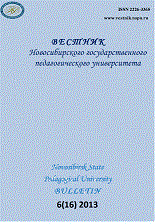РУССКИЙ ЯЗЫК В ЖИЗНИ И ТВОРЧЕСТВЕ АНРИ ТРУАЙЯ
THE RUSSIAN LANGUAGE IN D’HENRI TROYAT’S LIFE AND WORKS
Author(s): Raisa Ivanovna TeleshovaSubject(s): Language and Literature Studies
Published by: Новосибирский государственный педагогический университет
Keywords: Henri Troyat; French literature; the Russian language; explicit and implicit Russisms; intertextuality; Russian orientation; Russian world; bilingualism; biculturalism; transliteration
Summary/Abstract: The article focuses upon the influence of Russian culture and the Russian language on the works of a modern French writer d’Henri Troyat who has some Russian background but, by a twist of fate, lived most of his life in France considering himself a French writer with a Russian soul. Analysed are the role of a family in keeping mother tongue and the Russian traditions in d’Henri Troyat’s life, his thoughts about peculiar features of the Russian language, and intertextual inclusion of Russian lexis into French fiction. Frequent inclusion of Russisms reflecting local realities into artistic narration is a dominant stylistic device of d’Henri Troyat’s ‘Russian cycles’. Such Russisms manifest Russian spirit and Russian world, performing the function of creating ‘local coloring’, the image of Russia, which makes close links between the writer and his numerous personages. Implicit Russisms along with traditional explicit ones define their stylistic expression that depends also on their frequency. The expression of the Russian lexis is defined by its unusual sounding which helps make assosiations between Russian words and national environment where a certain language is functioning. The Russian lexis is preferably used transliterated in the speech of the author or personages of the Russian origin. There are rare cases when authentically spelt Russisms have been used in French texts. The thematic variety of Russisms is wide but the most active and large group includes everyday items. D’Henri Troyat, a bilingual writer, who agrees with theoretical philologists, emphasises the peculiar status of “expatriation language’ as a linguistic phenomenon. The writer, not aiming at investigating all linguistic details of that phenomenon, still makes it clear that such language really exists. D’Henri Troyat explains this by the fact that Russian emigrants believe it their misssion to keep Russian cultural and linguistic values and traditions. Most of his literary personages, bilingual and bicultural like the writer himself, consider a new French surroundings as a temporary condition of their existence. Russian-oriented descriptive passages in d’Henri Troyat’s works help the writer make his native country closer, and the French reader enjoy the beauty of such descriptions, and, in some cases, improve the translation of Russian cultural realities. The research is based on d’Henri Troyat’s works that are mostly unavailable in Russia and have been presented to the author of this research as a gift.
Journal: Вестник Новосибирского государственного педагогического университета
- Issue Year: 2013
- Issue No: 6
- Page Range: 129-139
- Page Count: 11
- Language: French

